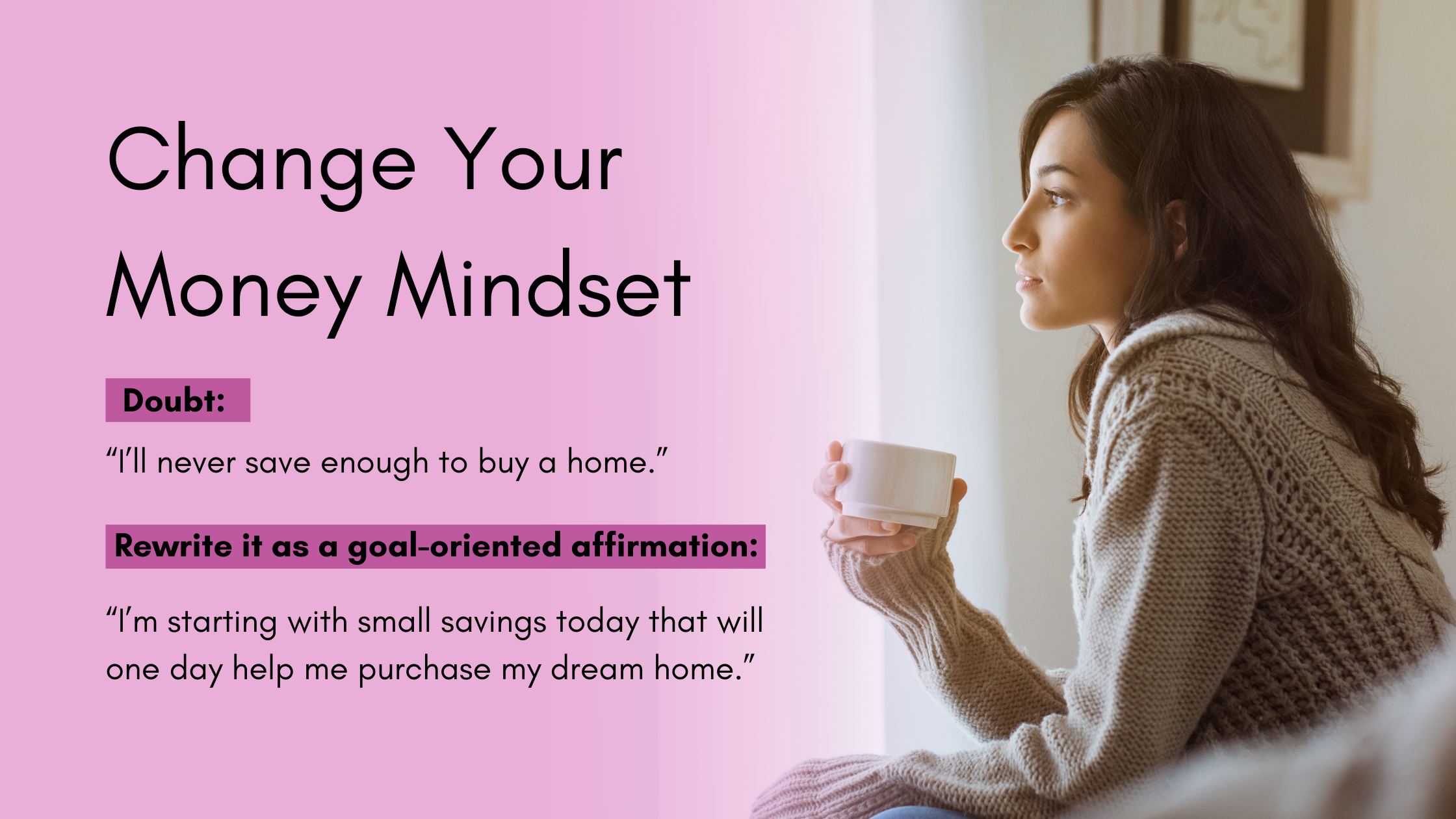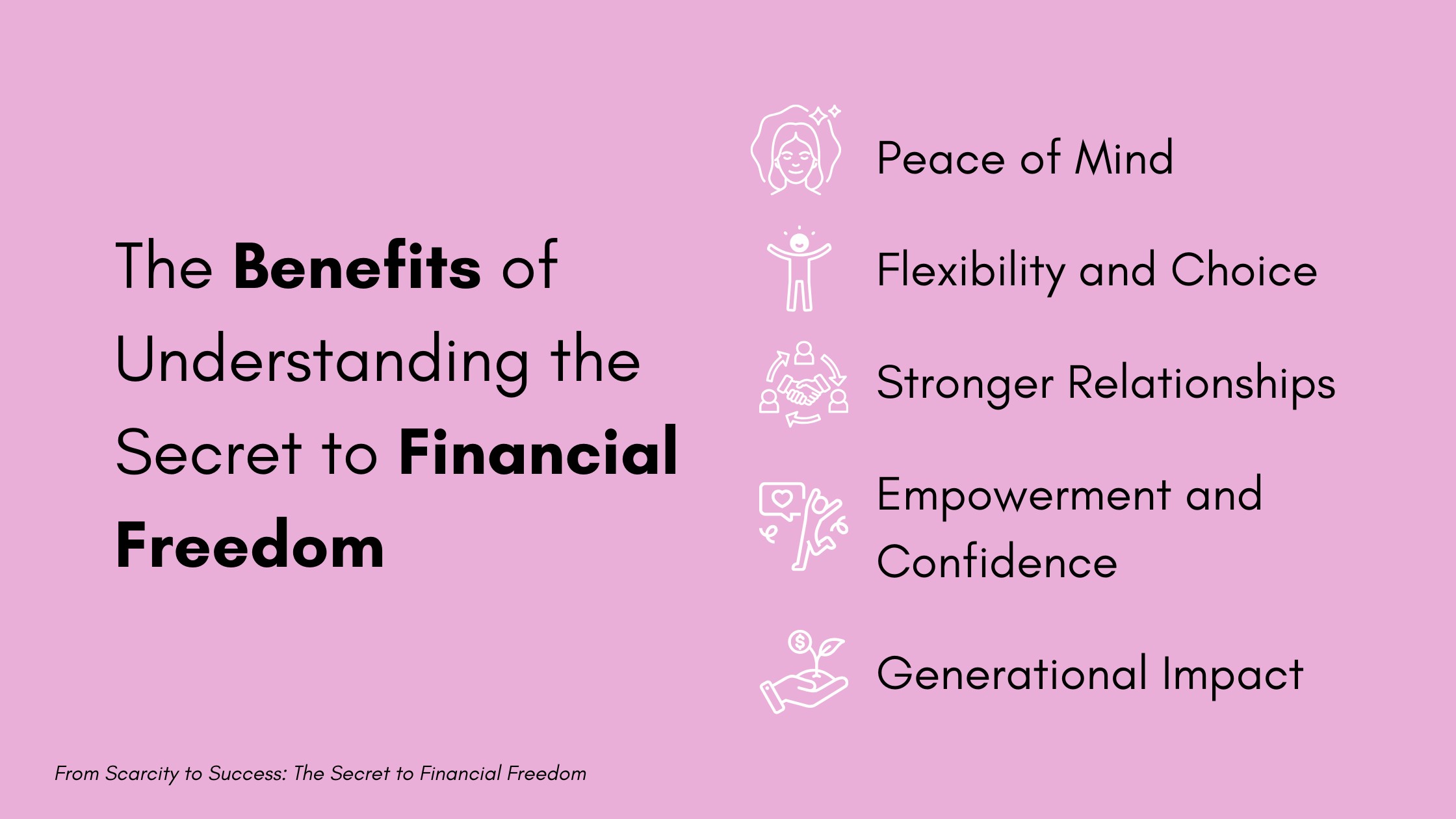
From Scarcity to Success: The Secret to Financial Freedom
Apr 06, 2025I remember sitting at my kitchen table, clutching an unopened bill, too scared to see the damage I knew was inside. My checking account was on fumes, my credit cards were maxed out, and despite working long hours, I couldn’t seem to make ends meet. The weight of scarcity felt like a constant companion—looming over my shoulder, whispering that I’d never escape this cycle.
Can you relate? If you’ve felt like you’re drowning in your financial struggles, I want you to know this—you’re not alone, and it doesn’t have to be this way.
I’m here today, writing this not from a place of fear or scarcity, but from a place of freedom and abundance—a place I didn’t believe was possible just a few years ago. This is a story of breaking free, of stepping into confidence, self-control, and ultimately, financial success. And I want to show you how you can get there too.
The Benefits of Understanding the Secret to Financial Freedom
1. Peace of Mind
Imagine waking up every day without the constant weight of financial worries. Understanding the secret to financial freedom allows you to confidently face life’s uncertainties, knowing you’re in control of your finances and prepared for whatever comes next.
2. Flexibility and Choice
Financial freedom gives you the ability to make decisions based on what truly matters to you, rather than being dictated by a paycheck or debt. Whether it’s pursuing a passion, moving to a dream location, or taking a well-deserved break, the choice is yours.
3. Stronger Relationships
Money problems are one of the leading causes of stress in relationships. By mastering your financial situation, you can foster healthier and more open communication with loved ones, building connections rooted in trust instead of tension.
4. Empowerment and Confidence
Taking control of your finances empowers you to tackle challenges with a sense of independence. This newfound confidence spills into other areas of life, helping you grow as a person and achieve goals you once thought were out of reach.
5. Generational Impact
When you achieve financial freedom, it doesn’t just transform your life—it sets a blueprint for future generations. By demonstrating solid financial habits and creating stability, you can help your family and community envision and build a brighter future.
When you unlock the secret to financial freedom, you open the door to a life of empowerment and possibility. It’s not just about accumulating wealth; it’s about reclaiming your time, your peace of mind, and your ability to focus on what truly matters. Financial freedom allows you to make decisions based on your values, not your fears. Imagine pursuing your passions without worrying about a paycheck or giving generously without hesitation. It brings a profound sense of security, knowing that you’re equipped to handle whatever life may bring. Most importantly, it allows you to create the life you desire—not one dictated by constraints, but one defined by your dreams and your purpose.
What is Financial Scarcity?

Financial scarcity can look like this—you’re standing in the grocery store, calculator in hand, mentally juggling which items you have to put back because your budget won’t stretch. It’s the pit in your stomach when an unexpected bill arrives, knowing there’s nothing left in your bank account to cover it. It can feel like working endless hours only to see your paycheck vanish into rent, utilities, and debt payments before you can even think about saving or enjoying life’s little pleasures. Financial scarcity is not just about the lack of money; it’s the constant weight of worry, the never-ending cycle of stress, and the sense that no matter how hard you try, you can’t seem to get ahead.
Financial scarcity doesn’t just exist in numbers—it’s a mindset. It’s waking up every day thinking, “I’ll never have enough” or “I can’t afford anything” before you’ve even had your morning coffee. It creates a cycle of fear, stress, and helplessness. But here’s the kicker—this mindset isn’t permanent.
You have the power to break free from it, one choice at a time.
The Turning Point
For me, the shift began with a hard truth. It wasn’t just about how much money I was making or spending—it was about how I thought about money. I’d spent years limiting myself with assumptions like, “I’m just not good with money” or “I’ll never make enough to be comfortable.” These thoughts were like bricks, building an invisible wall between me and financial freedom.
It wasn’t overnight, and it certainly wasn’t easy, but slowly, I started to tear that wall down. I replaced fear with curiosity, assumptions with education, and avoidance with action.
The Secret to Financial Freedom
What I’ve learned is that the secret to financial freedom lies not just in earning more or spending less, but in building four key habits. These habits completely transformed my relationship with money, and I believe they’ll be just as powerful for you:
1. Change Your Money Mindset

When you change your money mindset, you unlock a world of possibilities that goes beyond mere financial gains. The way you view and approach money can shift from feeling like a source of stress or limitation to becoming a tool for empowerment and opportunity. You’ll start to see abundance instead of scarcity, which allows you to make wiser financial choices without fear holding you back. This transformation fosters confidence, reduces anxiety around money, and helps you focus on long-term goals. By breaking free from limiting beliefs, you can open the door to new opportunities and create a positive cycle of growth, success, and fulfillment. It’s the foundation for achieving not just financial freedom, but the peace that comes with knowing you’re in control of your future.
First, ask yourself this question: do I truly believe I can achieve financial freedom? If the answer is no, start there. Write down the doubts that bubble to the surface. Then, counter each negative belief with a positive, action-oriented one.
For example:
- Doubt: “I’ll never save enough to buy a home.”
- Rewrite it as a goal-oriented affirmation: “I’m starting with small savings today that will one day help me purchase my dream home.”
Transforming your mindset takes time, repetition, and self-compassion but remember—your thoughts set the foundation for your actions.
2. Set Clear (and Achievable) Goals

Setting a clear goal serves as a compass, guiding your efforts and keeping you focused amid distractions. When you define what you want to achieve, you create a sense of purpose that fuels motivation and determination. Clear goals help break down overwhelming tasks into manageable steps, making progress feel attainable and rewarding. They also provide measurable milestones, allowing you to track growth and celebrate successes along the way. Most importantly, setting goals reinforces belief in your ability to shape your future, turning aspirations into actionable outcomes.
One of my biggest wake-up moments came when I realized I didn’t actually have financial goals—I just wanted “more money.” Here’s the thing, “more” is abstract. Instead, set specific and measurable goals.
For example:
- Save $5,000 for emergencies in a year.
- Pay off $10,000 in credit card debt within 2 years.
- Contribute $300 per month toward retirement.
When you have a target, you’ll have a reason to remain disciplined, even on the tough days.
3. Learn to Budget (without Fear)
Budgeting might feel restrictive at first, but it can open up incredible opportunities and peace of mind. When you stick to a budget, you gain a clearer picture of your finances, helping you avoid the stress of overspending or falling into debt. It empowers you to prioritize what truly matters—whether it’s achieving financial stability, planning for a dream vacation, or securing your future. Budgeting also builds confidence, as every small win, like staying under your grocery budget or saving extra for a goal, reinforces your ability to take charge of your money. It’s not about limits; it’s about creating freedom and aligning your money with your values.
Budgeting used to terrify me. I thought it meant giving up the little things I enjoyed, like my favorite weekend coffee. But budgeting isn’t about restriction—it’s about choice. It’s about taking control and giving your money a purpose.
To start:
- Track your spending for a month—it’ll open your eyes to where your money goes.
- Categorize expenses into needs (housing, groceries, utilities) and wants.
- Assign every dollar a job. Make room for both financial goals and small joys. A good budget balances your priorities.
- Steps to Achieve Financial Freedom
- Shift Your Mindset
The first step toward financial freedom begins in your mind. Challenge the limiting beliefs you may have about money. Instead of thinking, "I'll never be good with money," reframe it to, "I can learn to manage money effectively." A positive mindset lays the foundation for all the steps that follow.
1. Educate Yourself
Knowledge is power, especially when it comes to finances. Take small steps to educate yourself about budgeting, saving, investing, and debt management. Read books, listen to podcasts, or take online courses—whatever works best for you. The more you know, the more confident you'll feel in taking control of your money.
2. Create a Budget That Works for You
Budgeting isn’t about depriving yourself; it’s about identifying where your money is going and ensuring it aligns with your values and goals. Break down your expenses into needs, wants, and savings, and find a system—like the 50/30/20 rule—that feels sustainable for your lifestyle.
3. Save and Invest Consistently
Even if you can only start with small amounts, make saving and investing a habit. Build an emergency fund to cover 3-6 months of expenses, and then focus on long-term growth through investments like retirement accounts or index funds. The earlier you start, the more you benefit from compound growth.
4. Pay Down Debt Strategically
Debt can feel like a massive weight, but with a focused strategy, it can be tackled. Start by listing all your debts and choose an approach such as the debt snowball (starting with smaller balances) or the debt avalanche (focusing on high-interest debts first). Stay consistent, and celebrate your progress.
5. Set Clear Financial Goals
What does financial freedom look like for you? Define it in clear, achievable steps—whether it’s buying a home, traveling, or securing a comfortable retirement. Goals provide motivation and a sense of direction, making the process of managing money more purposeful.
6. Build Multiple Streams of Income
Relying on a single income source can be limiting. Explore ways to diversify your income, whether through side hustles, freelancing, passive income opportunities, or investments. This not only boosts your earnings potential but also provides greater financial stability.
7. Stay Committed and Flexible
The road to financial freedom isn’t always linear, and life will throw challenges your way. Stay committed to your goals but remain flexible in your approach. Adjust your strategies as needed while keeping your long-term vision in mind. Remember, progress is progress, no matter how small.
By taking these steps, you’ll move closer to the freedom to live life on your terms, feeling confident and empowered in your financial decisions. It’s not just about gaining more money—it’s about creating the life you truly want.
4. Build Small but Mighty Habits

Start by setting up an automatic transfer to your savings account each payday, even if it’s just $20. Over time, this habit grows your savings without requiring constant effort. The benefit? You reduce decision fatigue, stay consistent with your financial goals, and slowly build a safety net that can provide peace of mind in emergencies or help you achieve long-term dreams. Small steps have big impacts.
I used to think I’d need a windfall to get ahead—something huge to fix everything overnight. But my biggest progress came from the smallest daily habits:
- Automating savings—even $50 a month adds up faster than you think.
- Learning one new thing about money each week, like watching a YouTube video about investing or reading a financial blog.
- Checking my accounts weekly. Eliminating the fear of “not knowing” gave me control.
Little changes compound over time, just like financial growth itself. Success comes from consistency, not perfection.
Building Abundance, Together
Here’s what you must know about scarcity—it’s loud, it’s persistent, but it’s just a voice. And it’s not yours forever. When you commit to changing your relationship with money, you’ll find freedom too.
From saving for the future to enjoying the little luxuries without guilt, financial freedom isn’t just about the numbers—it’s about peace, confidence, and choice. It’s waking up knowing you control your life, not your bank balance.
If you’re ready to take this empowering step, start today. Don’t do it alone—surround yourself with people who share your goals, your stories, and your wins (no matter how small they feel). Together, we’ll go from scarcity to success.
And one last thing—take a moment to feel proud. By reading this, by considering this shift, you’ve already taken a big step toward something incredible. Keep going.
"Building Abundance, Together" is more than just a statement—it's a reminder that we’re not alone in this journey toward financial freedom and fulfillment. The path to abundance often feels isolating, with challenges that can seem overwhelming. But when we share our experiences, knowledge, and encouragement, we unlock the power of community. Together, we inspire each other to aim higher, celebrate small victories, and learn from setbacks. It's through this collective effort that true abundance becomes possible—not just in wealth, but in confidence, resilience, and the generosity to lift others as we rise.

Summarizing the Journey to Financial Freedom
This topic centers around transforming your mindset about money and breaking free from the grip of scarcity. It highlights the importance of consistency, community, and self-compassion in achieving financial freedom. The narrative emphasizes that true abundance isn’t just about wealth—it’s about peace, confidence, and having choices in life. By committing to change, surrounding yourself with supportive allies, and celebrating every step forward, even small ones, you can create a future of stability and empowerment. Most importantly, the message reinforces that taking just one step today is a brave and commendable act toward lasting freedom.

Don't miss a beat!
Subscribe to get our latest content by email.
We hate SPAM. We will never sell your information, for any reason.


